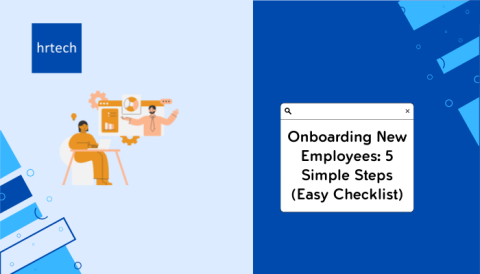
Talent Intelligence is changing every aspect of how we do things. However, only a small percentage of businesses understand talent intelligence’s scope and function, while 72% are increasing their investments.
The alignment of employer and employee demands in the face of changing work dynamics and retention issues is contingent upon talent intelligence.
There is an evident need to define talent intelligence and highlight the importance of specific definitions and focused HR digital transformation.
What is Talent Intelligence?
Talent intelligence employs artificial intelligence to transform data into insights that inform every stage of the talent life cycle. It can highlight organizational leaders’ skill patterns in their own and competitors’ workforces, allowing them to devise cost-effective strategies to acquire the necessary skills. It also provides employees with a powerful and equal platform for visibility, development, and advancement.
Talent intelligence is more than just a data-management tool; it is a purposeful blend of AI and skills analysis that helps deliver effective business results in both HR and business.
Talent intelligence synthesizes disparate data points to provide a clear and actionable picture of workforce dynamics, like an AI image generator may create graphics by merging numerous data inputs to produce a cohesive image.
Key Elements of Talent Intelligence
Talent intelligence is comprised of three fundamental elements. By combining these elements, businesses can gain a competitive edge through efficient personnel management and make well-informed decisions that support their long-term objectives. Let’s take a quick look at each of these elements.
1. Employeel Information
This part entails obtaining and studying data regarding the current workforce. It contains information about the abilities, backgrounds, performance indicators, goals for their careers, and demographics of the workforce.
2. Strategic Analysis
It entails utilizing talent market and employee data insights to guide strategic decision-making. It includes determining opportunities and problems about talent, establishing targets and goals for talent management programs, and creating workable plans to reach them.
3. Talent Market
This part contains external information regarding the job market. It provides data on job trends, salary standards, competitor analysis, and industry perspectives.
What does Talent Intelligence Do?
Talent intelligence is the driving force that matches individuals – both current staff and outside applicants – with the most suitable positions. It aids talent and business leaders in gaining insight into people’s abilities and potential for skill development.
1. Matches abilities to roles within an organization
Talent intelligence has the advantage of not replacing current HR systems. It complements current operations with deep learning artificial intelligence advice and is compatible with nearly all HR technologies.
Talent intelligence defines jobs using deep learning AI and combines publicly accessible local and global data with internal company data to help talent executives make better decisions. HR and business executives are provided with a comprehensive and up-to-date perspective on the abilities they will require in the present and future by this dynamic self-learning tool that assesses skills within enterprises and the broader market.
According to the results, leaders may see exactly what capabilities their entire workforce possesses and what hiring and training needs they have to meet to stay competitive in their respective industries.
2. Enhances DEI
Matching people has become essential to occupations based on their skill sets as the workforce changes and many roles take on new duties or become completely outdated. This will also result in the discovery of fresh talent with the ability to thrive, regardless of background.
For those who may not have previously been given the opportunity or consideration, talent intelligence levels the playing field for a large number of people, including women, veterans, persons with disabilities, and other underrepresented groups.
AI can take a person’s past and, using its knowledge of their career information, both internal and external data on roles available, and suggest appropriate jobs for them. Based on these evaluations of their talents and competencies, it can also identify applicants who are most suited for available positions for an organization.
3. Modern and Holistic Talent Strategies
Talent planning in the modern era requires a more comprehensive strategy. HR leaders can better understand their talent requirements now and in the future with the support of talent intelligence and a talent strategy.
Talent intelligence assists leaders in identifying the skills they require and deciding whether to build, buy, or borrow such skills. Demonstrating to employees how they may develop and improve in their professions, also helps employers retain talent through improving the employee experience.
The era of information silos, HR and talent executives operating in isolation, and top personnel searching for other opportunities is coming to an end thanks to this comprehensive perspective of all talent within the company.
Advantages of Talent Intelligence

The process of identifying the proper talent is challenging. There isn’t a single, universally applicable solution. A lot of trial & error and learning from your mistakes are frequently involved. That process can be facilitated by talent intelligence, which allows you to learn without making as many mistakes. This is how it can be useful.
1. Personalized Hiring Criteria
Posting a job opening and looking for applicants with little experience to cover it might not be the best course of action. The perfect job fit is not a person can do but also matches the company’s values and goals.
In addition to helping you match this data with other elements like behavioral patterns, core values, and future goals, talent intelligence provides a comprehensive view of the market and the company’s present and future talent needs.
2. Reducing Employee Attrition
Retaining talent is another area of concern after recruitment. By offering insights into the reasons behind employee departures and strategies for staff retention, talent intelligence can assist employers in reducing attrition.
A further useful tool for highlighting diversity and inclusion is talent intelligence. It can recognize potentially discriminatory language in job descriptions and offer suggestions for more inclusive wording. By removing subjective preconceptions about candidates, a blind screening and evaluation method makes it easier to evaluate each fairly.
3. AI in HR
Over time, the effects of Generative AI on HR will become more apparent. Artificial Intelligence is rapidly revolutionizing the field by streamlining procedures and automating repetitive jobs. AI-powered talent intelligence is also revolutionizing the HR industry since talent is what HR is all about.
AI-powered resume algorithms can quickly scan resumes, classifying and ranking them based on pre-established standards. It can also aid in lessening or mitigating unconscious bias in the hiring process, allowing for a more extensive and varied talent pool through improved productivity, blind application screening, and automated job suggestions.
4. Compensation Comparison
The function of talent intelligence in wage benchmarking is an additional topic of interest. Organizations can have more informed discussions about wage decisions and compensation structures with employees by using talent intelligence to give data for salary benchmarking. Employers must find ways to care for their staff and keep great talent.
5. Evolving Jobs
AI is changing the nature of HR professions by automating repetitive processes, allowing HR specialists to concentrate on more important work. An extensive perspective of the workforce ecosystem and a thorough comprehension of the talents within a business can be obtained through a talent intelligence platform driven by artificial intelligence. AI-powered talent intelligence improves HR operations by increasing their equity, effectiveness, and scalability.
Conclusion
Ultimately, organizations now have access to more data and automation because of the HR industry’s growth of new technologies and AI-driven solutions. HR directors are closely examining their HR IT stack to identify what is and is not generating value as they are under increasing pressure to make business decisions that drive performance and to do so within ever-tighter budgetary constraints.
Inefficiencies or overlaps in HRTech solutions constitute needless spending that is no longer seen as an essential expense of doing business. Ensure there are no redundant technologies in your stack by reviewing it.
Author Name: Pritesh
Author Bio: Pritesh is a blogger and tech enthusiast from Azilen Technologies He likes sharing his knowledge in a wide range of domains ranging from AI, data science, emerging technologies, and much more. His work is featured in several authoritative tech publications.



